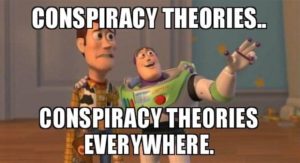Jul
22
2019
 Let me just start by saying – I don’t believe for a second that this one is real. I think it’s something between absurdist performance art, trolling, and marketing. But it does raise the question about the ultimate effects of such things, and therefore the ethics.
Let me just start by saying – I don’t believe for a second that this one is real. I think it’s something between absurdist performance art, trolling, and marketing. But it does raise the question about the ultimate effects of such things, and therefore the ethics.
There is an online faux movement called, “Birds Aren’t Real.” It is a fake conspiracy theory someone made up in order to make fun of other conspiracy theories, and perhaps sell T-shirts. The idea is that sometime in the 1970s the US government killed all the birds in North America and replaced them with identical drones in order to spy on its citizens. Of course this makes no sense on multiple levels. Why would they bother to kill all the birds, rather than just mix their drones in with the natural ones? Why hasn’t anyone captured or found one of these drones? And of course, the technology to pull this off is at least a century off, so how did the CIA (or whoever) pull this off 40 years ago?
The absurdity of this conspiracy theory is a feature, not a bug. The question is – why did someone bother? I can certainly see the fun in doing so. Read the website, it’s transparent (in my opinion) mockery. There are various theories as to what’s behind the movement, and what the true motivation is for those who created and who promote it. The cynical view is that they are just trying to sell merchandise by creating a brand. It may work. Others believe they are skeptics trying to expose the gullibility of conspiracy theorists. Or it may have all simply been a joke, or some version of trolling. It may be all of these things.
The question is – will the birds aren’t real meme take on a life of its own? This question has lead to perhaps the least likely theory, that this is all an elaborate social psychological experiment testing the limits of human gullibility. This theory, however, is really just another fake conspiracy theory, which starts the cycle of speculation all over again.
Continue Reading »
May
10
2019
 According to Texas House Representative Jonathan Stickland, Texas pediatricians should mind their own business when it comes to vaccines, which, by the way, are sorcery.
According to Texas House Representative Jonathan Stickland, Texas pediatricians should mind their own business when it comes to vaccines, which, by the way, are sorcery.
That some state representative is completely clueless should come as no surprise, nor that he exposes his cluelessness on Twitter. Here is the now infamous exchange:
In his first tweet Stickland starts with the shill gambit, which is a lazy personal attack used to casually dismiss the concerns of others. In this case Stickland is assuming, and publicly asserting, that the only reason a pediatrician might advocate for children getting vaccinated is because they are “bought and paid for.” He then basically tells the doctor to shut up, as if a medical doctor does not have a legitimate professional and even ethical responsibility toward the health of their patients. Finally he dismisses “science” as a conspiracy and asserts the rights of parents to be free from science.
That is a lot of nonsense to pack into one tweet.
Continue Reading »
Feb
05
2019
 I am still stunned that there are seemingly average people walking around today with the firm belief that the world is actually flat. The numbers, while still small, are also surprisingly high. In a recent survey only 84% of those surveyed were confident that the Earth is “round”. The rest expressed some doubt, were confident the Earth is flat, or were unsure. For those 18-24 only 66% were confident the world is round. (The survey was presented as a dichotomy between round and flat – it’s hard to say if this had any effect on the responses, but we’ll put that aside.) Belief in a flat Earth correlated with being young, religious, and poor.
I am still stunned that there are seemingly average people walking around today with the firm belief that the world is actually flat. The numbers, while still small, are also surprisingly high. In a recent survey only 84% of those surveyed were confident that the Earth is “round”. The rest expressed some doubt, were confident the Earth is flat, or were unsure. For those 18-24 only 66% were confident the world is round. (The survey was presented as a dichotomy between round and flat – it’s hard to say if this had any effect on the responses, but we’ll put that aside.) Belief in a flat Earth correlated with being young, religious, and poor.
Wrapping your head around this fact, for anyone with a modicum of scientific literacy and general sense, is not easy. But I am trying not to settle for any simplistic explanation of this phenomenon. Certainly any fringe movement like this is going to attract those with mental illness or an otherwise tenuous grip on reality. It also attracts dedicated conspiracy theorists. There are also the Sherri Shepherds of the world who simply can’t be bothered to clutter their mind with extraneous facts, such as the shape of the world on which they live.
But there seems to be still more going on, especially with the recent increase in this phenomenon. First, let me put to rest the scientific question – the Earth is undeniably roughly a sphere. I already reviewed some of the common arguments the flat-earthers raise, and they are all demonstrable nonsense. There are many sources online going over the countless hard proofs that the Earth is round. What flat-earthers do, like any conspiracy theorist, is look for anomalies and then declare the Earth is flat. What they don’t do, and cannot do, is explain all the actual observations that anyone can make, let alone those made by scientists and astronauts. They can’t explain lunar eclipses, or the changing orientation of the moon, direct observations of the curvature of the Earth from high commercial jets, or along very long bridges. And of course they can’t explain all of space travel and the countless images and videos from space showing a round Earth.
Continue Reading »
Aug
21
2018

I hate the headline of the Independent article about this new study – “Scientists discover the reason people believe in conspiracy theories.” No, they didn’t. What they potentially found was an additional factor that predicts conspiracy thinking, meaning that it correlates with it. A much better headline would be – “Scientists find that believing in final causes correlates with conspiratorial thinking,” or something like that.
I understand the need to make headlines eye-catching, but you can do that without misrepresenting the science. The body of the article itself, while it does a decent job of explaining teleology, also misrepresents the implications of the study in a typical way – it fails to put it into the context of existing research.
Mainstream science reporting often follows a typical narrative – we essentially knew nothing, then scientists made this breakthrough discovery, and now we fully understand “the” cause of whatever.
The real scientific narrative is often quite different – we know something about this complex phenomenon, but there is still much that is not known, and now scientists have added one more piece to the puzzle. This is actually, in my opinion, a far more compelling narrative, but you have to tell the whole story of the scientific question, not just the one study.
Continue Reading »
Aug
13
2018
 One of the persistent themes of this blog is that expertise matters. This is not to say the experts are always right (sometimes they disagree with each-other), and there is also a range of expertise, and different kinds of experts can have different biases and blind spots. But all things considered, someone who has formal expertise on a specific topic is likely to know much more about that topic than someone who has read about it on the internet.
One of the persistent themes of this blog is that expertise matters. This is not to say the experts are always right (sometimes they disagree with each-other), and there is also a range of expertise, and different kinds of experts can have different biases and blind spots. But all things considered, someone who has formal expertise on a specific topic is likely to know much more about that topic than someone who has read about it on the internet.
Further, most people underestimate the amount of knowledge that exists on a topic, and therefore the vast gulf of knowledge that exists between them and the experts. In fact, the more someone knows about a topic the more they understand how much is known, and the more humble they tend to be with respect to their own knowledge. The flip side of this – people who know little tend to overestimate their relative knowledge – is an established psychological phenomenon known as the Dunning-Kruger effect.
Operationally Dunning and Kruger found in their study that the lower someone performed on a test of knowledge, the greater the gap between their perceived knowledge and performance and their actual performance. At around the 80th percentile and above, people tend to underestimate their relative knowledge. Below that point they tend to increasingly overestimate it, and everyone thinks they are above 50%.
Continue Reading »
Mar
06
2018
 Recently Robert Ussery, 54, who founded conspiracy website Side Thorn, and his partner Jodi Mann, 56, were arrested for harassing parents who lost a child in the mass shooting that took place at First Baptist Church in Sutherland Springs on Nov. 5, 2017.
Recently Robert Ussery, 54, who founded conspiracy website Side Thorn, and his partner Jodi Mann, 56, were arrested for harassing parents who lost a child in the mass shooting that took place at First Baptist Church in Sutherland Springs on Nov. 5, 2017.
Last year Florida Atlantic University professor James Tracy was fired from his job, and lost his law suit to get his job back, for harassing the parents of children killed in the Sandy Hook massacre. Tracy believes the event was a hoax, and the parents just “crisis actors.”
The courageous high-school students from Parkland, Florida who decided to turn their tragedy into activism have been rewarded by also being accused of being fakes.
This is now a regular feature of mass shootings – after the tragedy survivors will be harassed by conspiracy theorists who believe they are part of some government hoax, a false flag operation. Such accusations are nothing new, but they have seemed to reach a new level and are now a regular part of the cultural landscape.
Continue Reading »
Feb
13
2018
 Being involved in skeptical activism for over two decades does provide some perspective. One phenomenon I have noticed is that most pseudosciences and weird belief systems are, at their core, the same. Sure, the details vary, but the underlying errors in logic and thinking are the same. Essentially people make the same mistakes over and over again.
Being involved in skeptical activism for over two decades does provide some perspective. One phenomenon I have noticed is that most pseudosciences and weird belief systems are, at their core, the same. Sure, the details vary, but the underlying errors in logic and thinking are the same. Essentially people make the same mistakes over and over again.
This, in fact, was the original motivation for developing a list of common logical fallacies. We kept encountering the same poor logic time and again and wanted to address the underlying cognitive errors. This is why scientific skepticism is so heavily involved with metacognition – thinking about thinking. There are thousands of fake medical claims out there, for example. Debunking every one is an endless game of whack-a-mole. Better to understand and address the underlying flaw in logic and method that leads to all the medical nonsense.
More recently this phenomenon has been dubbed, “Crank magnetism.” This is the closely related notion that people who believe on type of pseudoscience tend to believe multiple types – they tend to attract each other. The cause of this seems obvious – if your method is flawed, you will achieve the same flawed results over and over.
There may also be different flavors of crank magnetism, although there is a lot of overlap also. For example, there are conspiracy theorists who believe every conspiracy, there are spiritual true-believers who are prone to believing anything mystical, and there are “nature is best” fanatics who are vulnerable to marketing anything as “natural” and fearmongering about “the chemikilz.”
Continue Reading »
Oct
31
2017
 Just last week I discussed a study looking at the correlation between belief in conspiracy theories and hyperactive pattern recognition. The quick version is this – belief in false patterns (such as bizarre conspiracy theories) results from a tendency to detect false patterns and a lack of filtering out those detections. The question for psychologists is, how much of an increased tendency to believe grand conspiracies is due to increased pattern recognition and how much is due to impaired reality testing? My assumption would be that both are involved to varying degrees in different people. The study found that there is a correlation between conspiracy beliefs and pattern recognition – which supports that hypothesis, but does not refute the role of decreased reality testing or other variables, such as culture, ideology, and self-esteem.
Just last week I discussed a study looking at the correlation between belief in conspiracy theories and hyperactive pattern recognition. The quick version is this – belief in false patterns (such as bizarre conspiracy theories) results from a tendency to detect false patterns and a lack of filtering out those detections. The question for psychologists is, how much of an increased tendency to believe grand conspiracies is due to increased pattern recognition and how much is due to impaired reality testing? My assumption would be that both are involved to varying degrees in different people. The study found that there is a correlation between conspiracy beliefs and pattern recognition – which supports that hypothesis, but does not refute the role of decreased reality testing or other variables, such as culture, ideology, and self-esteem.
This week I am going to discuss another recent study looking at belief in conspiracies and their correlation with beliefs about the nature of knowledge (epistemic beliefs). These researchers are focusing on the other end of the equation – the methods we use to assess knowledge and form beliefs, rather than the more basic function of perceiving patterns. They start with a helpful review of previous literature:
There is also some evidence that individuals’ styles of thinking can influence their willingness to accept claims lacking empirical evidence. Individuals who tend to see intentional agency behind every event are more likely to believe conspiracy theories, as are those who attribute extraordinary events to unseen forces or interpret events through the Manichean narrative of good versus evil. Those who mistrust authority, who are convinced that nothing is as it seems, and who lack control over their environment are also more predisposed to conspiracist ideation.
Continue Reading »
Oct
23
2017
 Humans are conspiracy theorists. Seeing and believing in conspiracies appears to be a fundamental part of how our minds work. Psychologists are trying to understand rigorously exactly why this is, and what factors predict a tendency to believe in conspiracies.
Humans are conspiracy theorists. Seeing and believing in conspiracies appears to be a fundamental part of how our minds work. Psychologists are trying to understand rigorously exactly why this is, and what factors predict a tendency to believe in conspiracies.
A recent study adds to those that link conspiracy thinking with pattern recognition. The researchers did a series of experiments in which they showed that the belief in one or more conspiracies correlates with the tendency to see patterns in random data, such as random coin tosses or noisy pictures. Further, when subjects read about one conspiracy theory they were then slightly more likely to endorse other conspiracy theories and to see patterns in random noise.
They conclude:
“We conclude that illusory pattern perception is a central cognitive mechanism accounting for conspiracy theories and supernatural beliefs.”
This makes sense, which is why psychologists have been studying it in the first place. First, we know that people in general have a tendency to see patterns in randomness. That is part of how our brains make sense of the world. Essentially, we are bombarded with various sensory streams. Our brains parse those streams as best it can, filtering out noise and distraction, and then searching for familiar patterns. When it finds a possible match it then processes the information to make the perceived pattern more apparent. That pattern is then what we perceive.
Continue Reading »
Aug
11
2017
 If Alex Jones lived 150 years ago he would have traveled around with a horse-drawn wagon selling his patent medicine with a medicine show featuring amazing stories about hacking his way through the jungle to find cures and sitting down with Indian medicine-men to learn their secrets.
If Alex Jones lived 150 years ago he would have traveled around with a horse-drawn wagon selling his patent medicine with a medicine show featuring amazing stories about hacking his way through the jungle to find cures and sitting down with Indian medicine-men to learn their secrets.
Today he has his own TV show where he tells amazing stories of conspiracies in order to sell dubious supplements.
I have to admit, Jones had me fooled for a while. I was only paying slight attention to the nonsense he spewed on InfoWars, enough to know that he was a raving conspiracy theorist. I paid closer attention when he claimed that the Sandy Hook school shooting was a false flag operation. Anyone as popular and flamboyant as Jones is likely supplementing their true belief with showmanship. I now, however, think it’s more likely that Jones is pure showmanship.
Continue Reading »
 Let me just start by saying – I don’t believe for a second that this one is real. I think it’s something between absurdist performance art, trolling, and marketing. But it does raise the question about the ultimate effects of such things, and therefore the ethics.
Let me just start by saying – I don’t believe for a second that this one is real. I think it’s something between absurdist performance art, trolling, and marketing. But it does raise the question about the ultimate effects of such things, and therefore the ethics.
 According to Texas House Representative Jonathan Stickland, Texas pediatricians should mind their own business when it comes to vaccines, which, by the way, are sorcery.
According to Texas House Representative Jonathan Stickland, Texas pediatricians should mind their own business when it comes to vaccines, which, by the way, are sorcery. I am still stunned that there are seemingly average people walking around today with the firm belief that the world is actually flat. The numbers, while still small, are also surprisingly high. In a recent survey only 84% of those surveyed were confident that the Earth is “round”. The rest expressed some doubt, were confident the Earth is flat, or were unsure. For those 18-24 only 66% were confident the world is round. (The survey was presented as a dichotomy between round and flat – it’s hard to say if this had any effect on the responses, but we’ll put that aside.) Belief in a flat Earth correlated with being young, religious, and poor.
I am still stunned that there are seemingly average people walking around today with the firm belief that the world is actually flat. The numbers, while still small, are also surprisingly high. In a recent survey only 84% of those surveyed were confident that the Earth is “round”. The rest expressed some doubt, were confident the Earth is flat, or were unsure. For those 18-24 only 66% were confident the world is round. (The survey was presented as a dichotomy between round and flat – it’s hard to say if this had any effect on the responses, but we’ll put that aside.) Belief in a flat Earth correlated with being young, religious, and poor.
 One of the persistent themes of this blog is that expertise matters. This is not to say the experts are always right (sometimes they disagree with each-other), and there is also a range of expertise, and different kinds of experts can have different biases and blind spots. But all things considered, someone who has formal expertise on a specific topic is likely to know much more about that topic than someone who has read about it on the internet.
One of the persistent themes of this blog is that expertise matters. This is not to say the experts are always right (sometimes they disagree with each-other), and there is also a range of expertise, and different kinds of experts can have different biases and blind spots. But all things considered, someone who has formal expertise on a specific topic is likely to know much more about that topic than someone who has read about it on the internet. Recently Robert Ussery, 54, who founded conspiracy website Side Thorn, and his partner Jodi Mann, 56, were arrested for harassing parents who lost a child in the mass shooting that took place at First Baptist Church in Sutherland Springs on Nov. 5, 2017.
Recently Robert Ussery, 54, who founded conspiracy website Side Thorn, and his partner Jodi Mann, 56, were arrested for harassing parents who lost a child in the mass shooting that took place at First Baptist Church in Sutherland Springs on Nov. 5, 2017. Being involved in skeptical activism for over two decades does provide some perspective. One phenomenon I have noticed is that most pseudosciences and weird belief systems are, at their core, the same. Sure, the details vary, but the underlying errors in logic and thinking are the same. Essentially people make the same mistakes over and over again.
Being involved in skeptical activism for over two decades does provide some perspective. One phenomenon I have noticed is that most pseudosciences and weird belief systems are, at their core, the same. Sure, the details vary, but the underlying errors in logic and thinking are the same. Essentially people make the same mistakes over and over again. Just last week
Just last week  Humans are conspiracy theorists. Seeing and believing in conspiracies appears to be a fundamental part of how our minds work. Psychologists are trying to understand rigorously exactly why this is, and what factors predict a tendency to believe in conspiracies.
Humans are conspiracy theorists. Seeing and believing in conspiracies appears to be a fundamental part of how our minds work. Psychologists are trying to understand rigorously exactly why this is, and what factors predict a tendency to believe in conspiracies. If Alex Jones lived 150 years ago he would have traveled around with a horse-drawn wagon selling his patent medicine with a medicine show featuring amazing stories about hacking his way through the jungle to find cures and sitting down with Indian medicine-men to learn their secrets.
If Alex Jones lived 150 years ago he would have traveled around with a horse-drawn wagon selling his patent medicine with a medicine show featuring amazing stories about hacking his way through the jungle to find cures and sitting down with Indian medicine-men to learn their secrets.




